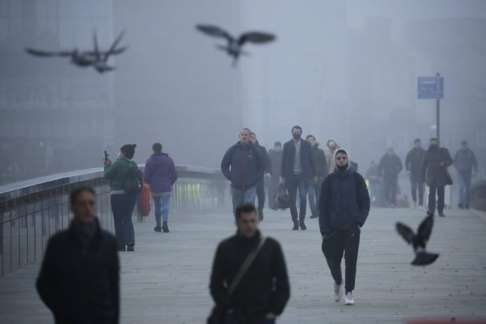
Several European countries have reintroduced lockdown measures and other restrictions as new coronavirus infections surge across the continent.
British lawmakers approved a month-long lockdown in England, voting on Wednesday in favour of Prime Minister Boris Johnson’s plan to try to prevent COVID-19 — the highly infectious respiratory disease caused by the new coronavirus — from running out of control and overwhelming health services.
Read more: Canada adds 3,276 new coronavirus infections as global cases surpass 48 million
Starting from Thursday, people will be ordered to stay at home to combat a surge in new infections that could, if unchecked, cause more deaths than a first wave, which forced a three-month lockdown earlier this year.
The 516-38 vote had been in little doubt after the opposition Labour Party said it would support the move, even though it criticized Johnson for acting too slowly. He was also criticized by some in his own party who said a national lockdown was too severe.
“None of us came into politics to tell people once again to shutter their shops, to furlough their staff or stay away from their friends and family,” Johnson told Parliament in an attempt to calm rebels within his Conservative Party.
The United Kingdom, which has the biggest official death toll in Europe from COVID-19, is grappling with more than 20,000 new coronavirus cases a day and scientists have warned the “worst case” scenario of 80,000 dead could be exceeded.
Those warnings forced Johnson to announce a U-turn on Saturday, having previously insisted on an approach of regional lockdowns.
Labour leader Keir Starmer said: “While these regulations are not in any way desirable or perfect, they are now necessary because the government has lost control of the virus.”
Meanwhile, in Italy, four regions are being put under “red-zone” lockdown, with severe limits imposed on the circumstances under which people can leave home, Premier Giuseppe Conte announced on Wednesday.
What he called “very stringent” restrictions begin on Friday for Lombardy, Piedmont and Valle d’Aosta in the north, and for Calabria, which forms the southern toe of the Italian peninsula.
The lockdown is aimed at tamping down a surge in COVID-19 infections and preventing hospitals from being overwhelmed with cases. Lasting at least two weeks, it will involve some 16.5 million of Italy’s 60 million residents and include the country’s financial capital, Milan.
[ Sign up for our Health IQ newsletter for the latest coronavirus updates ]
Barring very few exceptions, no one will be able to leave or enter the “red zone” regions. People there must stay home, except to go to work or shop for essentials. They can also exercise near their homes and while wearing masks.
After days of consultations with regional governors, Health Minister Roberto Speranza decided which regions received the “red-zone” designation.
“I know that these choices will mean sacrifices and difficulties, but they are the only way to bend the (contagion) curve,” he said in a statement. “United, we can do it.”
Video: Coronavirus: Italy makes masks mandatory outdoors in bid to reduce rising COVID-19 infections
Barbershops and hair salons can stay open, though other non-essential shops in the “red zone” must close.
Less severe restrictions on movement were decided for southern Sicily and Puglia, where people will be able to leave their homes, but can’t travel between towns or regions, and cafes and restaurants can only do takeout and delivery.
While classrooms are open in the rest of Italy except for high schools, which must do remote instructions, in the “red zone,” only nursery, elementary and the first year of middle-school will still have in-class instruction.
The latest crackdown was supposed to start on Thursday, but Conte said it will begin instead on Friday to allow time to organize. Designations will be reviewed every two weeks.
Also on Thursday, Greece ordered a nationwide lockdown for three weeks, its second this year, following a sharp increase in infections this week.
Under the new countrywide restrictions, to take effect from Saturday, retail businesses will be shut with the exception of supermarkets and pharmacies. Greeks will need a permit to venture outdoors at allocated times.
Primary schools will stay open, but high schools will shut.
Greece registered 2,917 new infections on Thursday, its highest daily tally since the outbreak started in February.
Source: Global News






